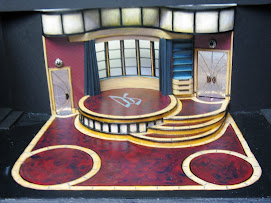
“What’s a movie? Specks of light stuck to a strip of celluloid. Did you ever think of it like that? A goddamn authentic miracle. A series of moments frozen in time by the only time machine ever invented.”
- David O. Selznick, from Moonlight and Magnolias
Gone with the Wind must have been David O. Selznick's best crack at immortality. An epic civil war picture, a monstrous budget, a story the whole world knew by heart, and... Clark Gable. In a way, he got it right. Movies are the best time capsules. It's the only technology that exists (thus far...) that can instantly transport us to a time, a place, or even a world we're not already in. The dead can walk. Beauty never fades. Stars of the past and present are captured, in that moment, forever. Or, for as long as people go to the movies.
Ron Hutchinson's Moonlight and Magnolias places us in 1939, at the height of the Golden Age of Hollywood. The Big Five: Metro-Goldwyn-Mayer, Paramount, Fox, RKO, and Warner Bros. dominate the industry. Films are churned out like cars on an assembly line under the studio system -- a highly-controlled form of production and distribution where the studios own everything: the sets, the equipment, chains of movie theatres. Even their stars and creative personnel were held under long-term contract. This gave them full control over every detail from beginning to end. At the helm of the operation? The Producer.
BEN HECHT: "David, I don't know whether this is a very good bad book or a very bad good book or more likely a bad bad book but I do know you'll never get a movie out of it -- (Selznick pulls the door open, indicates the brass plate on it--)
SELZNICK: "David O. Selznick. Producer."
In 1939, David O. Selznick had already accomplished a great deal. He had worked his way up as a story editor through RKO, then as Head of Production with MGM. He married the boss's daughter, Irene Mayer (yes, that Mayer) and now was head of Selznick International. He had been the driving force behind some of the greatest works in American cinema at the time: King Kong (1933), David Copperfield (1935), A Tale of Two Cities (1935), and The Prisoner of Zenda (1937). But these were the last days of the producer as unfettered dictator, and Selznick knew it. He says, "In a few years, this place is going to be like Egypt. Full of crumbling pyramids." It couldn't last forever. In fact, a law was passed just nine years later forcing the big production companies to give up their respective theatre chains, beginning the deterioration of the studio system.
Selznick had spent three years with the story at this point; three years of toiling over the plotline, casting, re-casting, hiring and firing... he had bought the rights to Margaret Mitchell's book in 1936, and was still struggling with the daunting task of adapting it into a workable screenplay. Finally, in January of 1939, he had a script by Sidney Howard. He had his Scarlett O'Hara. He had his Rhett Butler. He had his funders and everything seemed to be working out... but three weeks into shooting the picture, things weren't going as planned. George Cukor, director of GWTW and Selznick's long-time best friend, was spending too much time on principal photography, adding in his own dialogue, and in Selznick's opinion, was making it "pansified." Not what Selznick was looking for. In an act of frustration, he fired Cukor and shut production down entirely. He needed the time to re-work the script -- but the price-tag it came with was less than favourable for an already debt-laden production. It was costing Selznick $50 000 dollars a day to idle the picture.
His solution? Pull Victor Fleming from the set of The Wizard of Oz and throw him in the hole left by Cukor, call in the best script doctor in town, Ben Hecht, and lock all three of them in a room for five days. No food, no calls. Just bananas and peanuts (brain food, of course) and a typewriter. Vic's a little shaky on the plotline and Ben's never read the book... but with the help of his no-nonsense, oh-so-efficient secretary Miss Poppenghul (and perhaps a select few performance-enhancing narcotics), they'll get it done, and be on set by Monday.
Sound crazy? I beg to differ! The infinite monkey theorem suggests that "given enough time, a hypothetical chimpanzee typing at random would, as part of its output, almost surely produce one of Shakespeare's plays (or any other text)." Well, we've got bananas AND peanuts. We've got three dudes with a mind for film and a seriously magical secretary. Gone with the Wind? Feh.
***
Check back for regular updates on what's happening inside the rehearsal hall as well as some cast interviews, character profiles and more. Up next, notes from Fight Rehearsal with Rick Skene.
-- Andrea


No comments:
Post a Comment